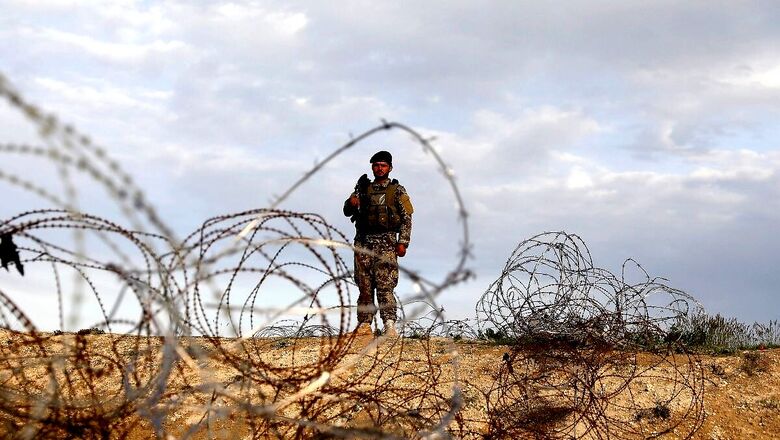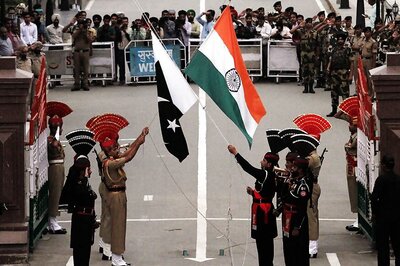
views
Amid Taliban’s rapid quest to get international recognition and financial support as US formally withdraws troops from Afghanistan in September, China is extending its interests in the country by eyeing access to untapped mineral resources, developing industries through Belt and Road Initiative, and ensuring Afghan doesn’t become a hotbed for Uyghur Islamic militants from Xinjiang province that shares border with the country.
China supported Taliban in 1990s because of the fear that Uyghur separatist movement could get support from Islamic terrorists and extremist groups operating from the Afghan soil. China supported the Taliban government from 1996 to 2001 by supplying weapons. That continued even after the 9/11 attacks when Taliban were largely known as a terrorist group. According to a BBC report, Britain sent messages to China on Taliban using Chinese weapons in attacks on British troops in Afghanistan.
China in fact has only increased its closeness to the Afghan insurgent groups, with last 20 years seeing several important Taliban visits to China.
And Taliban have assured China of returning the favour.
Taliban say they now control 85% of Afghanistan, including key border crossings on the borders of China, Iran, Tajikistan and Turkmenistan. The current government has disputed the 85% claim but Taliban now control large portions of Afghanistan. The insurgent group seized one-third of Afghanistan’s district this year including the Badakhshan province that borders with Uyghurs’ homeland Xinjiang province that was forcefully occupied by China 72 years ago.
Uyghurs don’t accept Chinese rule and the Uyghur freedom movement has seen emergence of militant groups that are either part of or supported by Al Qaeda.
But Taliban have assured China that it would not let the Afghan territory become a hub for Uyghur separatist movement; that it would not allow militants from Al Qaeda aligned East Turkistan Islamic Movement (ETIM) and other groups to operate from there; and that it ensure that Al Qaeda doesn’t carry out anti-China operations from Afghanistan.
Moreover, Taliban have also promised China access to Afghan mineral reserves and natural resources, that according to the World Bank assessment, has “world-class deposits of copper and iron ore, with mid-scale oil and gas fields that carry the greatest potential”. Taliban spokesman Suhail Shaheen said the group had been a regular visitor of China, a “friendly country”, and invited China to reconstruct and develop in Afghanistan.
But Taliban and Afghanistan are not going to have an easy day ahead after the removal of all foreign troops. Afghanistan is expected to see intense civil war after the September deadline for US troop pullback. Taliban doesn’t recognise the current Afghanistan government — a coalition of many warlords of the past—which will also not easily let Taliban to run over them.
The civil war between the existing government and Taliban has also been joined by old Mujahedeen warlords with the country witnessing revival of regional armed militias. Saving the existing government in Kabul together will also serve the purpose of keeping their regional fiefdoms alive and surviving even if it means weakening of the current Afghan government. The Taliban rule in 1990s had effectively killed the regional warlord supremacy in Afghanistan and it got revived only when the Taliban were uprooted in 2001. The 2001 American offensive lead to the formation of a government that not only restored the stature of regional warlords but also made them part of the government in a controlled and democratic set-up.
Afghanistan has seen decades of civil wars pushed by different world powers. First, it was by Soviet Union in 1980s that gave rise to different warlords. These warlords or Mujahedeen were then supported by US, and Pakistan acted an intermediary. In 1990s, the Afghan civil war was pushed by Pakistan through Taliban. After 9/11, US attacked Afghanistan and uprooted the Taliban government there for supporting Al Qaeda that was behind the 9/11 terror attacks.
But Pakistan never stopped supporting Taliban and Al Qaeda. It in fact became a safe haven for these terrorists, either through the government support or Afghan insurgent groups cornering Afghanistan-Pakistan border tribal areas that were beyond the control of the Pak government and army.
And now, Taliban is back again, claiming whole of the Afghanistan and warning all foreign troops to leave Afghanistan by September, a clear indication that it is going to launch all-out offensive after it. Taliban will need financial assistance and arms and ammunition support for it that a cash-strapped Pakistan cannot provide so China is expected to be in the driver’s seat during this civil war, with the clear objective to push its interests further in the country.
China, in fact, blames US for Afghan problems. Chinese Foreign Minister Wang Yi said the US is the source of the Afghan conflict.
Read all the Latest News, Breaking News and Coronavirus News here.




















Comments
0 comment